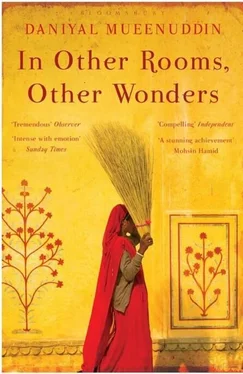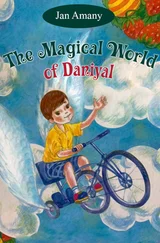‘He’s been waiting for you since yesterday afternoon,’ confided the valet. ‘He comes alive again, sir, before your visits. He almost missed his nap this afternoon.’
It’s a little dying world, she reflected, this household, these servants, the old man at the center. She had seen this before among her own relatives, one of her great-aunts who lived on into her nineties, quarreling with her maidservants, absorbed in prayer, ill-tempered, reputedly with boxes full of cash and gold salted away, though none of it turned up after her death. She was known for being tremendously miserly, yet when Lily went to call on her, as she took her leave, the old woman would tell one of the serving women to bring her gargantuan handbag, and would pull from it a surprisingly large amount of cash, saying, ‘Now remember me when I’m gone, young lady.’
Murad’s father met them sitting up in bed, wearing a thick green tennis sweater, the sheets on the bed freshly starched — the valet must have changed them when Murad called from the motorway to say they were approaching the city. Murad kissed him affectionately, then introduced Lily, who felt suddenly that she had worn the wrong clothes, too fashionable, too bright — a costume halfway Western, the shalvar more like slacks, the kurta fitted. The poverty of the room spoke of hours spent with nothing to do, the cracked imitation-leather slippers, the ugly cream-colored thermos of water — and the profusion of medicines.
The father really was very weak, with a fringe of long white hair and a sweet expression like a child, eyes straining. A mild and correct gentleman, he had never made anything of himself, had been selling land all his life to keep up appearances, himself the son of a great landowner, and an almost complicit victim of his elder brother’s machinations at the time of their inheritance. His wife had propped him up for as long as she could, the years wearing her down until her love shaded into contempt, difficult to hide, especially as the cancer cut away at her.
When they entered the room the father’s eyes lit up and his face became animated. He spoke gallantly to Lily.
‘My dear, you’re prettier even than Murad told me. He’s a lucky young man, you’re both … Very lucky …’
And then his voice trailed off and a set look came into his eyes, of resignation, of indifference — she found this fading in his manner disconcerting, expecting him instead to be distant and firm. Murad had not prepared her for this, the old man’s helplessness. The father patted the bed next to his leg and told Murad to sit down. After asking Lily several questions about her family, her mother and father, quite evidently not listening to the answers, he asked Murad questions about the farm, mechanically, each question unrelated to the one that came before, as if a set number of inquiries must be made. Lily sat quite close to him, on a chair that had been placed for her before they came into the room, and as she sat she absorbed the odors and the presence of this man, the father of her beloved, earthy and rank, some sort of pomade that old people wore, talcum powder, clean heavy bedclothes, dusty curtains. She noticed that, in the midst of his indifference, the old man stroked his son’s arm, tenderly, unconsciously.
‘Excuse me, I just need to speak to the accountants,’ said Murad, as they had planned — he had begged her to spend a little time alone with his father.
When Murad had gone out, the father’s expression became strained, the skin tight around his eyes. He appeared not to know where he should look. Just as she formulated an inconsequential question to break the silence, the old man looked up at her.
‘He mostly resembles his mother, do you know.’
She heard an apology in this, for the state in which she found him, lying in this bed.
Reaching beside him, the old man took a bell on a cord and rang it to call a servant. Then, turning to her, shrewd, he said, ‘The dance goes on, doesn’t it, young lady. He’ll be a good husband. And for you, I hope you’ll keep the faith. Perhaps it doesn’t matter either way. But I’m an old man, it would be better if you had waited until after I’m gone.’ He fell silent, the dentures in his mouth shifting and making a clicking sound.
In a photograph Murad had shown her of his father as a young man at Oxford many years ago, lanky, with Murad’s long and delicate face, not quite smiling, wearing an overcoat, a scarf tied tightly around his neck — already he looked cautious, insulated, at a loss.
He yawned like a little boy, his eyes flat, as if unseeing, and she observed that his hair standing up from the impression of the pillow looked exactly like the tuft of a bird. She didn’t comprehend his statement.
The valet came in and then Murad returned. As they left, returning to Islamabad, the old man pulled her close to him, kissed her on the cheek, and said, ‘Bless you, young lady.’
If at first she didn’t understand the old man’s words, later she dated from this experience the first blow against her belief that marriage would allow her fundamentally to change herself. This old man, whose embrace of his formidable wife had been enough like final love that her death ruined him utterly, nevertheless took so limited a view of what marriage could offer his only son, what Lily could offer. Perhaps he knew of her past, probably he did — Murad would have told him something, to inoculate against later disclosures made by mean-spirited relatives, the aunts or others.
She knew the feeling to be irrational, but this half-welcome into the family, though issuing from the stream of a life that had lost its force, hurt her deeply and persistently.
Right until the last minute the old man insisted he would be at the wedding, held in Islamabad at the house of Lily’s parents. It mattered a great deal to Murad, and she knew this, but they didn’t speak of it. She thought of him as strong, going directly to his purpose — as he had in his pursuit of her, or as she had seen once when his managers came to Islamabad with the quarterly budget from the farm, the respectful and straightforward way in which they approached him, the tough respect he accorded to them, and their businesslike application to the work at hand.
Yet with regard to his father his strength failed, as if his father’s weakness infected him too, sapped him. Two days before the wedding Murad came to her and said in a broken voice, ‘He’s not coming, I knew he wouldn’t.’
‘It doesn’t matter, darling. He’s sick, he wanted to be here.’
‘That’s just it,’ he said angrily. ‘He never wants to be here. He sold the best parts of the property for nothing, because he couldn’t be bothered to oversee the sales. He let my relatives take all the shops in the city, the valuable city land. And then, after puttering around doing nothing for most of his life, he took to his bed. I always felt unprotected, and I still do. I always felt that he took the view, Aprés moi, le déluge . My mother wouldn’t forgive him, even when she was dying. I was the stolen prince living in a stable, while the other branch of the family ate up whatever they could reach. Now I’ve come back and taken some of what’s mine, but my father is still there, still refusing me.’
Soothing him, touching his face, she thought of the blessing the father had given her, almost malevolent. ‘I’m the same way, darling, that’s why we found each other. I’m cut off too. We’ll do it together. We’ll have our own new separate life.’
She didn’t press him more than that, and soon the moment passed, Murad covering his anger and grief by throwing himself into the last-minute preparations.
A manager arrived the night before the wedding, bearing the old family jewelry in a leather handbag that must have belonged to Murad’s mother, the tikka ornament for Lily’s head wrapped in a faintly scented handkerchief, a gold cloisonné choker set with pearls and rough diamonds, and two long strands of emeralds, the largest of them the size of toffees.
Читать дальше












